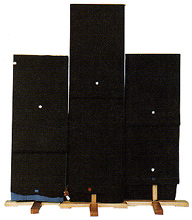Traditional Crafts in Aichi
Nagoya Kuromontsuki-zome

April 27, 1983
Major productsKimono material
Local associationNagoya Yuzen Kuromontsuki (black crested kimono) Cooperatives Association
Telephone: 052-981-0997
Facsimile: 052-981-0997
History of manufacturing districts
The origins of Nagoya Kuromontsuki-zome date back to 1610 (in the Keicho era of the Edo period) when the Owari feudal Kozakai family undertook the manufacture of flags and streamers in the feudal domain. Later, the underlying technique of modern Monkatagami-itajime was invented.
Features of the products
There are two dyeing methods: hitashi-zome (soaking) and hiki-zome (brushing). In hitashi-zome, paper stencils are used to cover the areas where family crests are to be printed. The time-consuming process using a low-concentration dye solution produces a rich black. Meanwhile, hiki-zome is characterized by techniques to achieve a glossy black (i.e. torobiki-kurozome or mitsuhiki-kurozome).
Manufacturing method
In hitashi-zome, paper stencils are pasted on a cloth and clamped with wire mesh from both sides. After a pre-dyeing process, the cloth is soaked in a black dye solution.
In hiki-zome, the areas where family crests are to be printed are covered with starch paste, and the cloth is dyed with a brush with torobiki-kurozome or mitsuhiki-kurozome techniques. In the final process, family crests are hand-drawn in the undyed areas.








